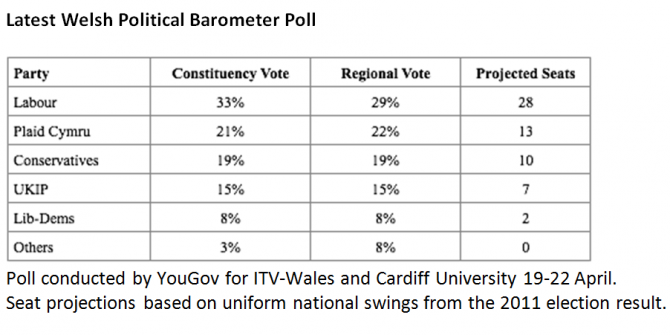
Ahead of the Welsh Assembly elections on Thursday 5th May, Roger Scully analyses each party’s prospects.
Labour’s history of dominance
Only a brave person would bet against the Labour party coming first in next week’s Welsh Assembly election. Labour have long been the dominant political force in Wales. Subsequent to Lloyd George’s victory in the 1918 ‘Coupon’ election, there have been 37 Wales-wide electoral contests (25 general elections, eight European elections and four National Assembly contests). Labour have finished first in 36 of these 37 – the only exception being the 2009 European election when they finished narrowly behind the Conservatives.
Demographic change
Yet the historic bases for Labour hegemony in Wales, most obviously the industrial trade unions, have long since largely disappeared. In more recent times Labour support has been heavily grounded in public-sector employment but, in an era of austerity, that too is in retreat.
These social changes have started to have electoral consequences. The last two general elections have seen the two lowest Labour vote shares since 1918 – worse results even than that secured under Michael Foot in 1983. The picture has not been one of uniform decline – in 2011 Assembly election, with many Welsh voters reacting against the then coalition government in London, Labour scored its best ever result at a devolved election. But that result now seems the exception to the general pattern. Moreover, with public evaluations of Labour’s record in the Welsh Government generally being poor, and Jeremy Corbyn’s leadership of the UK-wide party doing Labour few favours either, it appears almost certain that Labour will lose both votes and seats in 2016. The only serious question is the extent of the retreat.
Labour losses, Conservative gains?
Until very recently, it looked likely that the Conservatives would be Labour’s strongest challengers. Devolution was something that the Welsh Tories fought against for years. Yet, in the event, it has turned out to be quite kind to them. Even a relatively weak performance in the first devolved election got the Tories back on the Welsh electoral map in 1999, after they had been wiped out in the 1997 general election. The party has gained ground at every subsequent National Assembly election, becoming the second largest party in 2011. And after a successful 2015 general election, the Conservatives began 2016 in confident mood, expecting further gains.
TATA Steel
But in recent weeks it all seems to have gone wrong. The series of misfortunes that have hit the Tories – splits over the EU referendum, an unpopular budget, the Duncan Smith resignation, and questions about the tax affairs of the Prime Minister – have had a noticeable impact in Wales. In addition, there has also been a specifically Welsh dimension to Tory troubles. The problems of Tata steel have dominated much of the Welsh news in the last month, and polls show the Welsh public to be strikingly unimpressed with the response of the Conservative UK government to the crisis. The Conservative campaign for the Assembly also appears to be being hampered by some party activists neglecting their duties here in favour of putting in efforts for the Leave side in the EU referendum. All of this adds up to Conservative prospects that are looking rather gloomier than they did even two months ago.
Plaid Cymru
The stronger challenge to Labour may therefore come from Plaid Cymru. The last decade and a half has been much less kind to the Welsh nationalists than their Scottish counterparts. It is difficult for many people to believe now that in 1999 Plaid actually won a higher share of the vote in Wales, across the two ballots, than did the SNP in Scotland. But after ejecting their popular leader, Dafydd Wigley, the following year, Plaid then spent more than a decade drifting downwards electorally.
On becoming leader in early 2012, Leanne Wood inherited a party that had just experienced its worst-ever devolved election, finishing third for the first time ever. Its reduced status has meant that the party has struggled even more for media attention – at least until Wood’s inclusion in the 2015 televised leader debates. Even the latter, while helping increase Wood’s profile and popularity substantially, produced very little pay-off in terms of more votes for her party in 2015. However, Plaid have run a good Assembly election campaign so far; the produced by some way the most detailed manifesto of the parties, and one whose ideas have won praise well beyond the usual circle of Plaid cheerleaders. The most recent Welsh poll put the party in a clear second place, and apparently on an upwards trajectory.
The Liberal Democrats
If Plaid Cymru are apparently battling the Conservatives for second place, the Liberal Democrats, who have been the fourth-largest party throughout the lifetime of the Assembly, are fighting for survival. In 2011 – amidst dreadful losses for the Lib-Dems in the English local elections and the Scottish Parliament election, plus the lost referendum on the Alternative Vote – Wales was a relative bright spot for the party. They lost only one of their previous six seats in the Assembly. But since then times have grown ever tougher for the party.
At both the 2014 European election and the 2015 general election, the Liberal Democrats’ vote share was even lower in Wales than in either England or Scotland. All polls over the last year have projected the party to lose all four of their regional list seats in the Assembly. Even the party’s sole constituency seat – Brecon & Radnor, held by their widely-admired leader, Kirsty Williams – is under serious threat from the Conservatives, who won the constituency decisively at the general election. The most recent poll showed some improvement for the party. But electoral wipe-out for the Welsh Lib-Dems is not impossible.
UKIP
UKIP have never won a seat in the Welsh Assembly. In truth, until 2014 they had never done much in Welsh politics – they failed to win a single council seat in the 2012 Welsh local elections, for example. But in 2014 the party almost beat Labour in Wales in the European election, and followed this up by winning more than 13 per cent of the vote in last year’s general election (saving every single one of their forty electoral deposits in the process). All recent Welsh polling has shown the party likely to win several regional list seats in the Assembly this year – despite an often shambolic election campaign, and the selection of some unpopular and gaffe-prone candidates. UKIP may well under-perform their poll rating on the day: they did so in 2011, while the main energies and focus of many of their supporters is already concentrating on the June EU referendum rather than the Welsh Assembly contest. But even if they fall some way below their current poll ratings, UKIP are likely to arrive in the Assembly in some numbers – giving them their first substantial contingent in a domestic legislature. That could well be the big electoral story to emerge from Wales in 2016.

 For the latest analysis of 2016’s electoral contests, go to UK Elections 2016 on GovBlog.
For the latest analysis of 2016’s electoral contests, go to UK Elections 2016 on GovBlog.

Roger Scully is Professor of Political Science in the Wales Governance Centre at Cardiff.
Follor Roger on Twitter – @roger_scully






An excellent review. But “ejecting” Dafydd Wigley? I don’t think that is a valid historical statement.